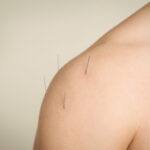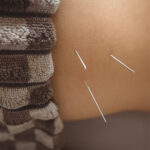Introduction to Acupuncture
Acupuncture is an ancient practice originating from Traditional Chinese Medicine (TCM). It involves inserting thin, sterile needles into specific points on the body to stimulate energy flow, also known as qi (pronounced “chee”). This stimulation is believed to:
- Restore balance
- Enhance healing
- Provide relief from various ailments
While acupuncture is widely recognized for its effectiveness in pain management, it is also used for conditions such as stress, digestive disorders, and insomnia.
“Scientific research has shown that acupuncture can help manage chronic pain and improve overall well-being.” – National Center for Complementary and Integrative Health (NCCIH Website)
“A 2020 study in the Journal of Pain Research found that acupuncture effectively reduced stress and improved emotional well-being in patients with chronic anxiety.” (Journal of Pain Research)
In recent years, scientific research has provided insights into how acupuncture works. It is thought to influence the nervous system, releasing neurotransmitters and endorphins, which help reduce pain and improve well-being. Despite skepticism, acupuncture has been integrated into mainstream healthcare, often recommended as a complementary treatment.
Benefits and Common Uses
Pain Relief
- Chronic conditions: arthritis, migraines, lower back pain, and fibromyalgia
- Injury recovery: sports injuries, joint pain, and muscle tension
- Nerve pain: sciatica, neuropathy, and facial pain
Mental Health Support
- Reduces stress, anxiety, and depression
- Helps regulate mood by releasing endorphins
- Supports better sleep and relaxation
Digestive Disorders
- Helps manage irritable bowel syndrome (IBS), acid reflux, and nausea
- Improves gut motility and reduces inflammation
- Complements dietary and lifestyle changes for better digestion
Procedure and Safety Considerations
How Acupuncture Works
- Thin, sterile needles are inserted into acupoints on the body.
- Acupoints correspond to specific organs and functions.
- Needles stimulate the nervous system and immune response.
- Sessions last 15 to 30 minutes, with mild sensations like tingling or warmth.
Safety Measures
- Sterile needles: Regulated by the U.S. Food and Drug Administration (FDA) (FDA Regulations).
- Certified practitioners: Seek professionals licensed by the National Certification Commission for Acupuncture and Oriental Medicine (NCCAOM) (NCCAOM Website).
- Minimal side effects: Slight bruising or soreness at needle sites may occur.
Conclusion
Acupuncture is a time-tested therapeutic practice with a growing body of scientific support. Whether used for pain relief, stress management, or digestive health, it offers a holistic and non-invasive approach to wellness.
Key Takeaways:
- Acupuncture stimulates natural healing mechanisms.
- It is effective for pain relief, mental health, and digestive issues.
- Safety and proper practitioner credentials are crucial.
If you are considering acupuncture, consult with a licensed acupuncturist and explore reputable sources such as the World Health Organization (WHO) (WHO Website) for further information on its benefits and applications.
Looking for expert acupuncture in London Ontario? Our trusted acupuncturist, Tracey Li, is here to help.
She will address your health concerns with personalized treatments designed to alleviate pain, reduce stress, and restore balance.











